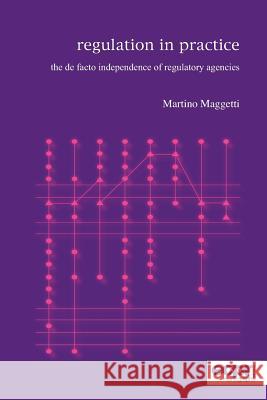Regulation in Practice: The de facto Independence of Regulatory Agencies » książka
Regulation in Practice: The de facto Independence of Regulatory Agencies
ISBN-13: 9781907301285 / Angielski / Miękka / 2013 / 276 str.
This book develops and applies an inventive theoretical approach to the comparative study of the neglected aspect of the real (or "de facto") independence of regulatory agencies. The book begins with an examination of the organisational and institutional factors shaping the de facto independence of regulatory agencies in Western Europe. There follows an analysis of the role of independent regulatory agencies in the policy-making process, using de facto independence as an explanatory variable. The final section is devoted to the relationship between regulatory agencies and the news media. In the conclusive discussion, the author also tackles a set of normative questions, which relates to the virtues and perils of independence.
This book develops and applies an inventive theoretical approach to the comparative study of the neglected aspect of the real (or "de facto") independence of regulatory agencies. The book begins with an examination of the organisational and institutional factors shaping the de facto independence of regulatory agencies in Western Europe. There follows an analysis of the role of independent regulatory agencies in the policy-making process, using de facto independence as an explanatory variable. The final section is devoted to the relationship between regulatory agencies and the news media. In the conclusive discussion, the author also tackles a set of normative questions, which relates to the virtues and perils of independence."Many scholars have acknowledged the importance of the informal dimensions of regulatory independence but few have managed to study them convincingly. In this essential book, Maggetti shows how the informal aspects of independence can be analysed systematically and demonstrates their importance for the role of regulatory agencies in policy-making processes. Maggettis work is bound to have a lasting impact on the way we think about the independence of regulatory authorities." - Fabrizio Gilardi, Professor of Political Science, University of Zurich."The field of regulation and governance is thriving and fast becoming one of the most exciting area of research in the social sciences in general and political science in particular. Martino Maggettis study of de facto independence demonstrates how and why the field is blooming. Maggetti moves the research forward in an impressive way - from the formal aspect of institutional independence to its the informal and day-to-day practices. To understand the limits, promises, success and failures of regulatory agencies we need to measure, correlate, analyse and interpret de facto independence. Maggetti gives us an important tool for analysis and in doing so pushes the study of regulatory institutions and regulatory performances significantly forward." - David Levi-Faur, Professor of Political Science, the Hebrew University of Jerusalem and Freie Universität Berlin."After thirty years of research on the formal independence of regulatory agencies, Martino Maggetti conceptualises, measures and explains de facto, practical independence. This book offers original data and a fascinating comparative design: it will be indispensable to those engaged with regulatory studies, comparative public policy, and institutional design."Claudio Radaelli, Professor of Political Science,Director, Centre for European Governance. University of Exeter"Only a few scholars have been able to assess how de facto independence of regulatory agencies relates to their formal discretion. In this thought-provoking book, which is a must-read for students and researchers in regulation studies, Martino Maggetti shows, in a highly innovative and rigorous way, that de facto independence of agencies is not even explained by their formal independence, but rather by their life-cycle and inclusion in networks. The book shows clearly how central IRAs are in policy making and how this is affected by this independence. The approach in this book is highly enlightening theoretically, in terms of triangulation of data collection methods as well as by the use of comparative configurational methods. This book is nothing less than a major and crucial contribution to the field." - Koen Verhoest, Research Professor, Department of Politics, University of Antwerp











